Fact or Fiction: Debunking The Game Changers Movie
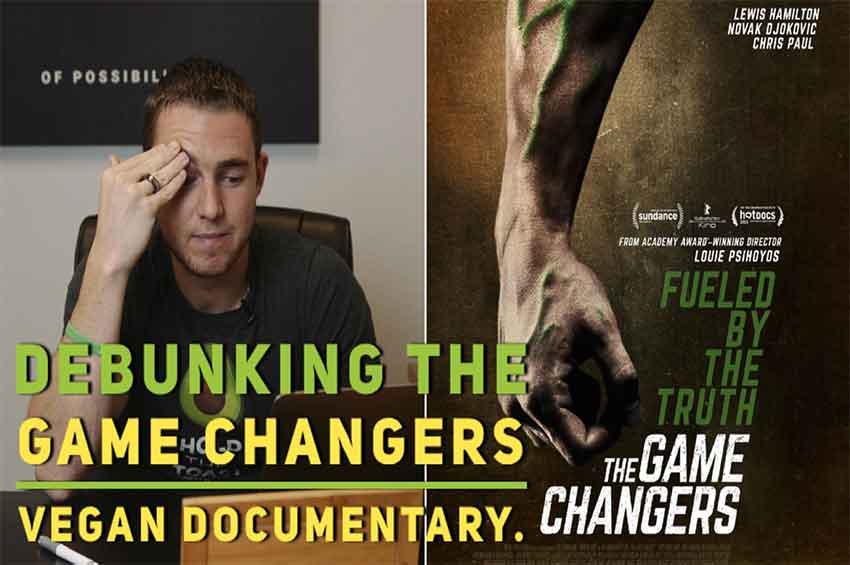
Documentary bias is a common phenomenon in film. While some filmmakers take precautions to avoid implicit bias during the process, others may choose a one-sided approach on more controversial topics. Funding is a key motivator behind the perpetuation of bias in film. Sometimes the bias of the filmmakers is obvious, and other times you really have to ask yourself what benefit are they gaining for making this movie? In the case of The Game Changers, the motivation and biases were strikingly apparent.
What is The GameChangers?
The Game Changers is a documentary that was recently released on Netflix and it explores the benefits of a plant-based diet. This documentary did not attempt to portray a neutral standpoint that explored scientific research from both sides of the plant-based vs meat consumption argument. Rather, it lacked context and misrepresented several studies (including a study done by our laboratory) and completely omitted any counter-research.
The Game Changers documentary utilizes striking imagery and (skewed or poorly conducted) scientific research to alter your thinking and persuade you toward a plant-based approach. The trailer featured celebrities who were the epitome of strength and fitness and promised to explain how you’ve been lied to when it comes to vegetarianism, veganism, and fitness. Unfortunately, while the intent of the movie was to dispel myths about health and athleticism on a plant-based diet, it was heavily biased and riddled with scientific errors.
I Am Not Anti-Vegan
Let me make this clear: I am not anti-vegan. I am not anti-plants. At the same token, I am not anti-carnivore either. As a scientist, I despise the misrepresentation of research in the name of pushing an agenda and aim to provide people with context to make their own decisions based on actual science. While the initial intent might have been good, I believe due to the lack of context and counter evidence, documentaries like The Game Changers may do more harm than good. Therefore, I wanted to address their points in this video and further breakdown in this article in hopes I can help more people understand both sides of the spectrum.
Before getting into these discussions, I’d like to point out three things I thought this video did well:
- Production Value: The cinematography in The Game Changers was well done and covered many anecdotal stories.
- High Profile Representation: Icons like Arnold Schwarzenegger promoted the video, even though he was actually in it for a few minutes. Names like Jackie Chan and Chris Paul were leveraged to increase representation and attention to the movie which certainly helped them make their case.
- Shock Value: Numerous visual representations were created to create shock value in The Game Changers (i.e. showing cloudy blood and looking at the hardness of male erections when comparing plant vs meat-based meals). Though they looked cool and convincing, these shock value representations were extremely flawed as I will discuss below.
In my video discussing The Game Changers movie, I go through ten of my biggest arguments against statements made in this documentary and provide factual and scientific research to back up my claims, which are outlined below.
The Game Changers Argument 1: The Roman Gladiators
One of the major opening arguments in The Game Changers documentary is based on the greatest warriors of all time—the Roman gladiators. Anthropologists studying the remains of these gladiators found high levels of strontium, indicating a diet heavy in vegetables. In fact, these warriors were nicknames “Horearii” meaning beans and barley muncher. [1]
While this data paints a grandiose image of strong warriors snacking on beans, the idea that Roman gladiators ate a primarily vegetarian diet means little without context. Movies and media have warped our image of these individuals and the Roman gladiator image we commonly think about (chiseled 6 pack) likely wasn’t the reality.
The same study that was cited about the strontium levels also explained that gladiators were “prisoners of war, slaves, and condemned offenders.” [1] Anthropological research has shown that these gladiators did consume a primarily plant-based diet, but not because it was healthy. Most likely, these foods were consumed to fatten the warriors so that they would have an extra layer of protection for their nerves and blood vessels. Additionally, barley and wheat was a lot cheaper and was the best gladiators could afford to provide sustenance to their bodies. [2]
A paper published in the Journal of Nutrition Science Research explained this difference between ancient eating habits and performance. During this time, doctors determined diet and nutrition for athletes. “One such form of sport was the ancient gladiator, and here we learn from Galen, that beans were highly recommended in order to build bulk into such athletes.
On broad beans: ‘Our gladiators eat a great deal of this food every day, making the condition of their body fleshy – not compact, dense flesh like pork, but flesh that is somehow more flabby.’” [3]
Dr. Grossschmidt, a Paleo-Pathologist who studied ancient gladiators had this to say:
“The vegetarian diet had nothing to do with poverty or animal rights. Gladiators, it seems, were fat. Consuming a lot of simple carbohydrates, such as barley, and legumes, like beans, was designed for survival in the arena. Packing in the carbs also packed on the pounds. “Gladiators needed subcutaneous fat,” Grossschmidt explains. “A fat cushion protects you from cut wounds and shields nerves and blood vessels in a fight.” Not only would a lean gladiator have been dead meat, he would have made for a bad show. Surface wounds “look more spectacular,” says Grossschmidt. “If I get wounded but just in the fatty layer, I can fight on,” he adds. “It doesn’t hurt much, and it looks great for the spectators.” [3]
Now let’s compare the Roman gladiators to Olympians—specifically participants of the ancient Olympics. According to a paper published in the Journal of the Philosophy of sport,
“The ancient Olympics were open only to free men and boys of Greek descent who swore an oath not to sin against the games; victory was viewed as a confirmation of aristocracy… Gladiators, in contrast, occupied the class of moral outcasts called infamia, and they were apparently forced to kill for entertainment….
Gladiators were compelled to fight, if not by their masters then by their oath, or by the fact that someone was charging at them with a knife. Ancient Olympic athletes, in contrast, volunteered not only for the contest but also for a mandatory month-long training camp just before the games.” [4]
Ancient Olympic athletes were true strength and endurance athletes. Stone carvings and statues from ancient Greece depict men with god-like figures very similar to modern-day bodybuilding physiques. These ancient Olympians were some of the first athletes to incorporate meat into their diet in order to improve performance. Some of the earliest records of prescribing a meat-heavy diet to athletes dates back to a trainer named Pythagoras (not to be confused with the philosopher and mathematician). [5]
Charles Stocking, a professor of classical studies at the University of Western Ontario, explained the fact that meat was a prized object only for the most wealthy or influential. Studies show that at the end of the first Olympic games, the winner sacrificed an animal and won the best pieces of meat from that sacrifice. Stocking said “It shows the status reserved for Olympic victors… Because meat was usually reserved for sacrifices to the gods, not part of the daily diet, introducing meat into an athletes’ diet was especially significant.” [6]
In fact, it would seem some of these athletes even began to consume a lower carbohydrate diet before competing. Francine Sega, a food historian, said “A lot of ancient writers wrote that for optimal physical performance, athletes should avoid grains and bread for six months before the Olympics.” [6]
In The Game Changers, to say that the best warriors of all time consumed a vegetarian diet is a weak argument and really doesn’t prove a point. Experts in the field have shown that Roman gladiators consumed diets heavy in beans and because these foods were cheap and meant to add mass (likely fat mass). Ancient Olympic athletes, on the other hand, were like celebrities who were privileged to be fed a diet heavy in meat products.
The Game Changers Argument 2: Vegans Are Stronger than Meat Eaters
Conor McGregor is an extremely skilled UFC fighter. The Game Changers uses one fight that Conor McGregor, a big meat-eater, lost against Nate Diaz, a vegetarian/vegan, as an argument to show that vegetarians have superior strength and energy levels as compared to meat-eaters.
This fight was taken completely out of context. McGregor was originally supposed to be fighting at 155 pounds against Rafael dos Anjos who canceled due to an injury. McGregor was cutting weight as the time and forced to quickly try to add mass back on before the Diaz fight. According to Chanel Sonnen, a former UFC title challenger, Diaz entered the ring that day weighing in at 181 pounds, with McGregor standing at 166 pounds. That is a 15 pounds difference. [7]
While Conor ended up losing that fight, five months later (and still consuming meat), McGregor fought Diaz again at a higher weight and won. Many individuals argue that Diaz was the one at a disadvantage because he only had 11 days to prepare for the fight but weighing 15 pounds heavier than his opponent gave him a much larger advantage.
Again, another poor argument or representation of a superiority complex of plant-based diets over meat-based diets in The Game Changers. Though it does show that you can perform on a plant based approach, one could make the argument that most of the best fighters in the world eat primarily meat. (https://www.youtube.com/watch?v=0ZE1vWBm3bk)
As an aside, I thought it was pretty comical to include Arnold’s scene from Escape Plan when he tells Sylvester Stallone “You hit like a Vegetarian.” Who would have guessed he would be the face of a plant-based documentary only 5 years later? (https://www.youtube.com/watch?v=LLaOIXXalK8)
The Game Changers Argument 3: Plant-Based Diets Are Superior for Endurance Athletes
This section of The Game Changers focuses on Scott Jurek, a world-record ultramarathoner. This is a focal point for the idea that endurance athletes can run on a plant-based diet. While this idea is not incorrect, it is one-sided in making it seem that this diet is superior for endurance athletics. In fact, Scott Jurek doesn’t hold the record for the fastest time on the Appalachian Trail. He finished the trek in 46 days, 8 hours, and 7 minutes. In 2017, Joe McConaughy broke the record – his diet consisting of 8,000 calories a day including dried sausage. [8]More recently in 2018 Karel Sabbe smashed the record and finished it in 41 days, 7 hours, and 39 minutes [9] Guess what his diet consisted of – bacon, eggs, and yogurt. [10]
Though there is no direct research comparing a meat vs plant-based diet on endurance performance, which should be conducted into to make claims that a plant-based approach is superior to other diets. Zach Bitter is a great example of an endurance athlete, who holds the 100-mile American record and who also happens to follow an animal based ketogenic diet. [11]
Again, a poor argument to use without bringing to light proper context.
The Game Changers Argument 4: The Average Plant-Eater Gets 70% More Protein Than Needed
The whole goal of this portion of The Game Changers documentary was to prove that you can consume more than enough protein on a plant-based diet. The issue is, total protein content means very little without context. Let me try and paint a picture for you of what this means. If you were tasked with building a house and were only given 1000 boards of wood, it would matter the type and quality of the wood. If Person A has brand new, fully complete boards of wood while Person B has older wood with some cracks and some boards that are rotting, which house do you think will be stronger? Similar to the boards, not all proteins are equal. Just because one source of protein has 50 grams and another source has 50 grams DOES NOT mean they will have the same response.
The beneficial aspects of protein are dictated by their essential amino acid content. Specifically protein quality should be measured by its branched chain amino acid (BCAA) and more specifically, leucine content. [13]
The BCAA and leucine content for animal vs plant-based sources varies drastically.
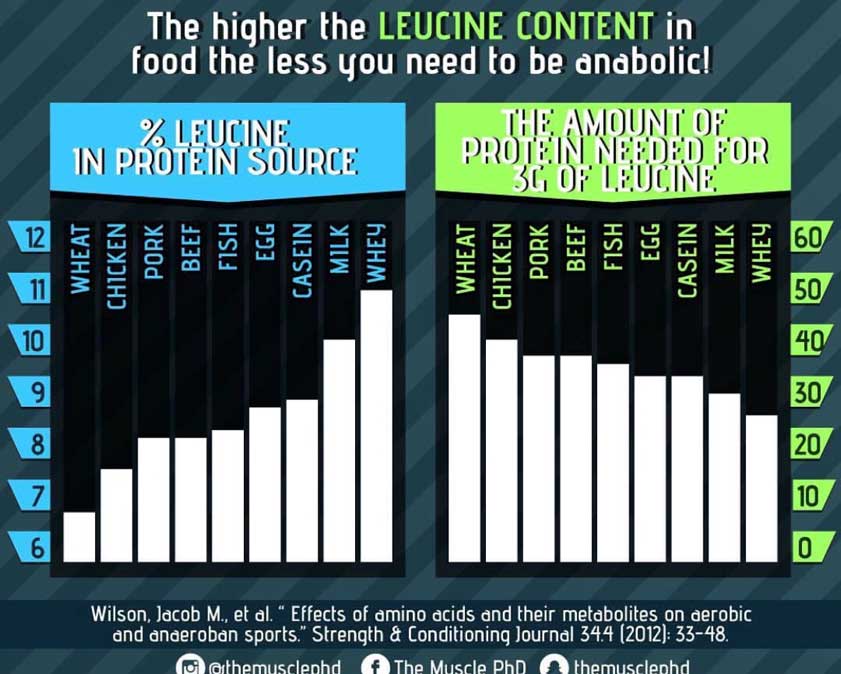
As you can see here, whey contains about 11-12% leucine while wheat contains about 6-7% leucine. Thus, in order to hit the 2-3 grams of leucine needed to maximize muscle protein synthesis you would need 25 grams of whey versus 45 grams of wheat protein to hit that threshold. [14]
This becomes very important when it comes to body composition. Dr. Gabriel Wilson showed that the quality of protein and the distribution of that protein determines the anabolic signaling and body composition benefits (wheat protein was significantly worse than whey protein) [15]
This was further demonstrated in a study by Cambell et al (1999). [16] They investigated a lactoovovegetarian diet (meat free) compared to an omnivorous diet on body composition and muscular strength combined with 12 weeks of resistance training. They found that the omnivorous group gained about 2 lbs of muscle while the vegetarian group lost muscle.
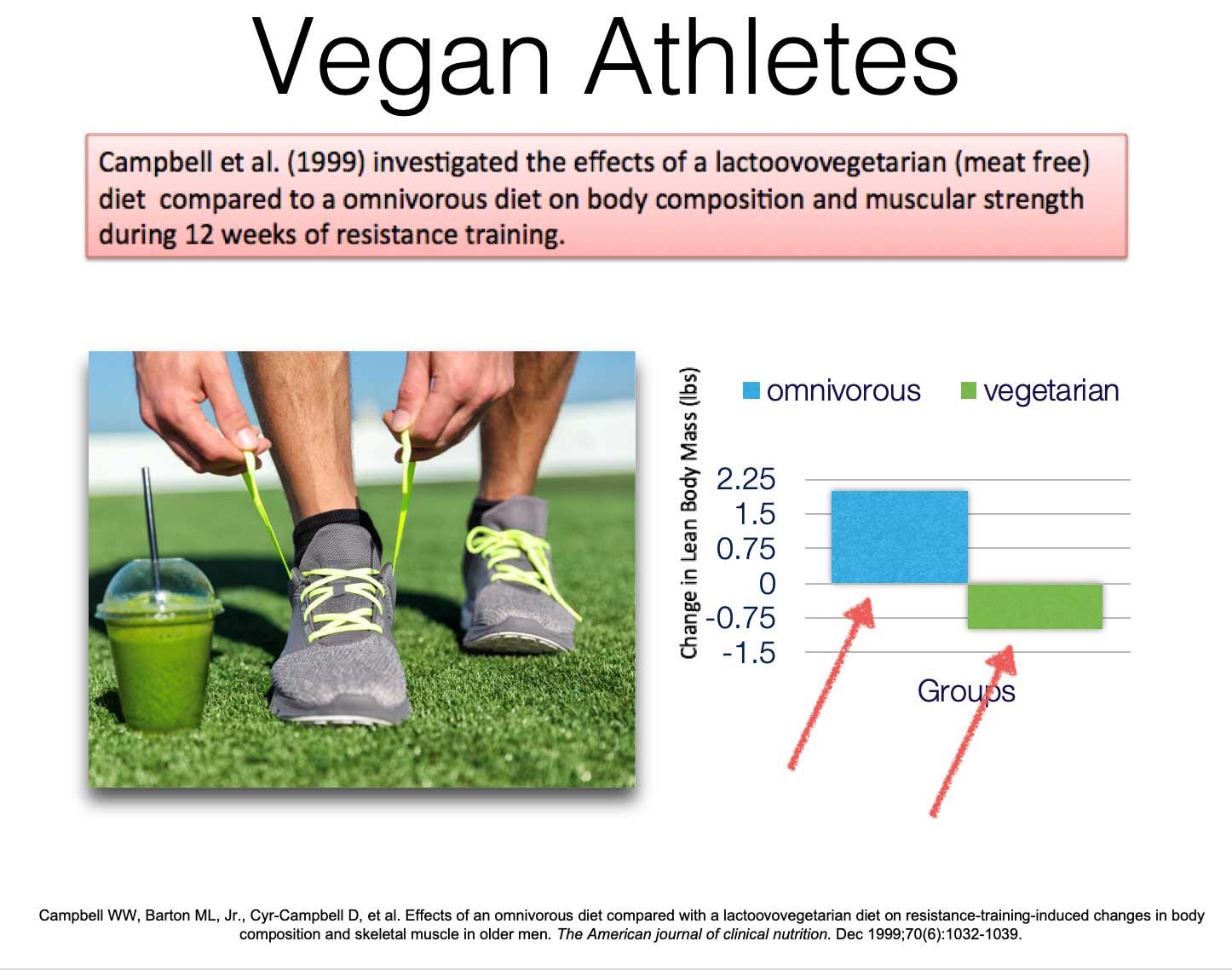
Aside from directly comparing amino acid content, we know from several research studies that whey protein is superior to soy/plant-based protein for altering body composition and promoting lean muscle mass gains. In a paper published by Baer, et. al. a double-blind clinical trial was conducted on the effects of whey versus soy protein supplementation in 90 individuals. The individuals consuming whey protein saw an average 1.8kg difference in body mass, with a 2.3g kg drop in fat mass, whereas the soy protein consuming group saw no difference in body mass or composition. [17]
In the study Ingestion of whey hydrolysate, casein, or soy protein isolate by Tang et. al, it was concluded that muscle protein synthesis was induced to a greater degree by whey hydrolysate than soy after exercise. This was presumed to be due to the rate at which protein was digested and the differences in leucine content (ie.e. Whey having a higher leucine content). [18]
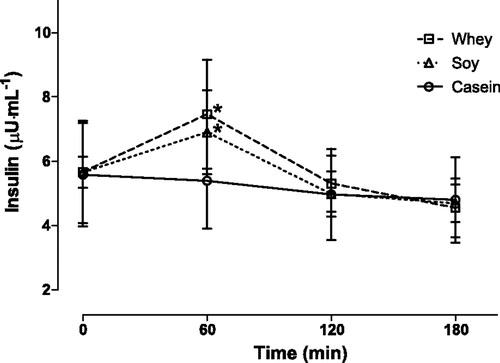
Plasma insulin concentrations increased the highest after ingestion of whey hydrolysate indicating increased glucose uptake within muscle cells.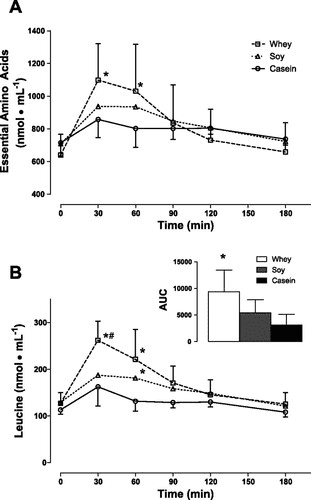
Blood concentrations of both leucine and all essential amino acids where greatest after ingestion of whey hydrolysate in comparison to casein or soy protein.
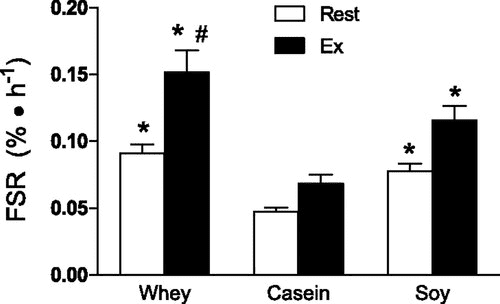
Mixed muscle protein fractional synthetic rate (FSR) was greatest in the whey protein consuming group as compared to casein and soy groups.
Moreover, in a 2013 study by Volek, et al., the effects of whey protein compared to soy protein for muscle mass gains were evaluated. The authors found that despite the testing groups have similar protein intake and total daily calories, the whey protein was more effective than the soy at promoting lean muscle mass gains. The authors concluded with “These results highlight the importance of protein quality as an important determinant of lean body mass responses to resistance training.” [19]
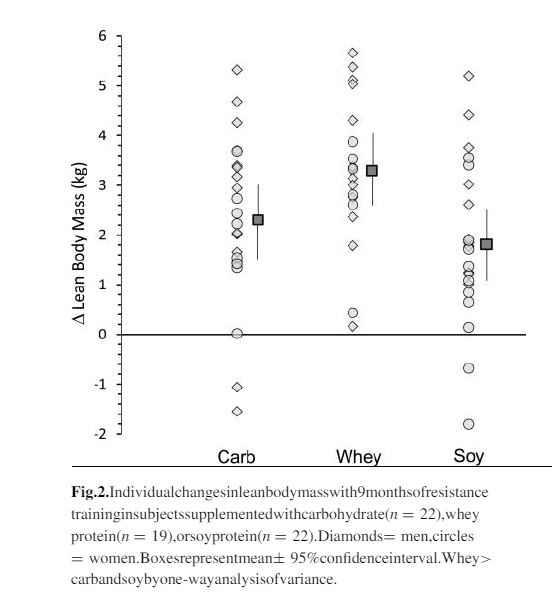
These studies are concrete evidence that protein quality does matter and has a drastic impact on body composition and lean mass gains. If you think about this logically, it makes sense logically. Think about carbohydrates in context of sugar and fibers. A candy bar may have the same amount of carbohydrates as a vegetable, but the source of carbohydrates may be primarily from sugar, whereas the vegetable is from the fiber. They are different qualities, even though they are the same amount of nutrients.
This becomes even more important as we age. As we get older, we start to develop “anabolic resistance” meaning that our bodies don’t respond the same as when we were younger. [20] Thus, protein quality becomes even more important the older we get!
The Game Changers Argument 5: Cloudy Blood After Meat Consumption
In The Game Changers, this was a powerful visual demonstration. Dr. Vogel brought in three athletes from the Miami Dolphins to demonstrate blood content after consumption of meat or plant-based meals. After consumption of their designated meat or plant-based meal, the player’s blood was drawn and spun to show the separation (red blood cells on bottom, buffy coat in the middle, and serum at the top). The serum was shown to be cloudier in the individual who consumed meat as compared to the plant-based meal.
This is meant to be a visually shocking demonstration but is taken completely out of context. You have circulating triglycerides in your blood after consumption of fat, the same as how you have circulating glucose after a carbohydrate-rich meal. In a study by Wolfe (1996) [21] individuals were infused with pure fat directly into their bloodstream. They found that insulin nor glucose rose and that fat was almost immediately used for energy (very little fat in the blood). However, when they infused these same individuals with a fat and varying amounts of carbohydrates, they saw fat utilization decreased, fatty acids in the blood increased, and both insulin and glucose increased.
“Glucose decreased fat mobilization by both inhibiting lipolysis and stimulating reesterification, thus causing a significant increase in triglyceride-fatty acid substrate cycling within the adipose tissue.” [21]
This means when fat is consumed alone, it acts as a fuel source that directly gets broken down and utilized, but when coupled with carbohydrates, they actually cause fat utilization to decrease (i.e. think about a Big Mac or even an Impossible Burger with the bun). In the study shown in the documentary, the individuals consumed both high fat and high carbohydrates in the “meat” condition which likely contributed to the decrease in fat utilization, hence the cloudy blood. The bean burrito clearly had less fat than the meat-based burritos and didn’t have the same impact – not because of the meat but because of the low-fat nature. While the base was the same, the meat burritos had what appeared to be around 3oz of meat, plus 2-4 tbsp of shredded cheese, in contrast to the bean burrito which had the same amount of beans and no shredded cheese. 3oz of black beans only contain 0.8g of fat, whereas ground beef is going to have around 13-16g and even 3 oz of chicken breast (the leanest part of chicken) has 3g– over 3 times that amount of fat in the beans.
They then try to use a study titled “Hass avocados modulate postprandial vascular reactivity and postprandial inflammatory responses to a hamburger in health volunteers” to show the consumption of plants with meat lowers inflammatory responses. [22] This study actually found no statistical difference in blood vessel functioning. The documentary makes it seem like this study shows individuals who ate meat showed inflammatory markers after eating, but those who ate meat and avocados did not.
The study participants were divided into two groups of either eating meat or eating meat and avocado. The participants did not consume any meat products three days prior to the study, which could have altered their metabolic response. They found no statistically significant differences (p>0.05) in arterial blood flow or inflammatory markers (except at hour 4 with IL-6). [22] The only thing that can be interpreted from this study is that it is a good idea to incorporate avocados, likely higher amounts of potassium, and a good source of monounsaturated fats into your diet.
*Interesting to note that throughout the documentary they stated that most of the studies showing benefits of meat are biased due to funding. Here is the disclosure statement for the aforementioned study (note it was funded by the Hass Avocado Board) [22]
 Dr. Robert Vogel makes a huge point in The Game Changers to say that meat consumption causes endothelial damage and when the endothelium can’t dilate, then blood flow decreases and impairs athletic performance and recovery. He cites studies like this one and the avocado study as evidence, but let’s take a deeper look:
Dr. Robert Vogel makes a huge point in The Game Changers to say that meat consumption causes endothelial damage and when the endothelium can’t dilate, then blood flow decreases and impairs athletic performance and recovery. He cites studies like this one and the avocado study as evidence, but let’s take a deeper look:
- Postprandial hypertriglyceridemia impairs endothelial function by enhanced oxidant stress [23]
This study looked at high fat consumption, not animal or plant sources. The study does not detail the meal that was given, but rather just that it was a high-fat meal. Furthermore, it does not detail whether or not the participants had any underlying conditions that affected their ability to metabolize fat. In Giannattasio, et. al, they found that a high fat meal (again not plant vs animal, just high fat vs low fat) did cause endothelial dysfunction but, “This impairment is evident in dyslipidemic patients with baseline hypertriglyceridemia but not in normotriglyceridemic controls.” [24]
- Hass avocados modulate postprandial vascular reactivity and postprandial inflammatory responses to a hamburger in health volunteers [221]
Again, the researchers found no statistical difference in arterial functioning and the consumption of the burger versus burger and avocado.
To make such a bold statement that animal production consumption causes endothelial dysfunction warrants research to back it up and they provide none. It is EXTREMELY important to differentiate between CORRELATIONAL and CAUSALITY. To that extent, though correlational, the only studies they provided were studies that found no differences in healthy individuals and did not compare plant versus animal products, but rather higher fat (non-ketogenic) versus lower fat meals.
In order to try to counter the effects of meat on endothelial function, they compare it to beetroot juice supplementation, which can allow cyclists to cycle 22% longer and lifters to bench 19% more weight. This has nothing to do with the plant versus animal debate, but rather blood flow from nitric oxide production. [25] Arginine and citrulline are common ingredients in pre-workouts because they are both amino acids that increase nitric oxide production. Citrulline actually converts into arginine, which is the main amino acid needed for nitric oxide biosynthesis. Nitric oxide is a vasodilator, which means it expands blood vessels and allows for increased blood flow. The reason beetroot improves exercise performance is because of this, not just because it is a plant. In fact, foods like turkey, pork, chicken, and beef are high in L-arginine. Meats, poultry and seafood are all rich in L-citrulline. All of these foods can improve exercise performance and increase blood flow through increased nitric oxide production. [26] [27] [28] [29] Moreover, a study that directly compared a vegan diet to a Mediterranean diet (MD) found that “the MD led to improvements in microvascular function (in general) and NO bioavailability (specifically) in a healthy sedentary population”. [30]
It is also claimed that meats contain endotoxins which promote inflammation. These claims are not backed up with any research whatsoever. Gram negative bacteria have endotoxins, also known as lipopolysaccharide (LPS), in their outer layer; these toxins act as a kind of defense mechanism for bacterial cells. [31]Numerous studies have shown low endotoxin counts in meat products. To claim that meats are full of these toxins that are destroying your body is a far-fetched claim with no scientific evidence to back it up. [32] [33]
“In healthy individuals, LPS does not cross the intestinal barrier easily and LPS is metabolized in animal tissues, particularly the liver, and in the lungs. Endotoxins that reach the respiratory tract are rendered harmless by macrophages and polymorphonuclear leukocytes. Thus, endotoxin would not be expected to accumulate in edible tissues. An endotoxin-contaminated feed ingredient would therefore not pose a risk to the consumer of animal products.” [33]
All of the studies cited in the connection between meat consumption and deadly diseases are correlational studies. Correlation does not equal causation. All these studies did was ask participants what medical conditions they suffered from and what kind of foods they ate. They do not account for total caloric intake, exercise, smoking, stress, or any other factors that can contribute to these diseases. [34]
The Game Changers Argument 6: The Only Diet That Has Ever Been Shown to Reverse Heart Disease Is A Plant-Based Diet
This statement in The Game Changers is based on a research study that was poorly explained. The abstract of this study says, “In a prospective, randomized, controlled trial to determine whether comprehensive lifestyle changes affect coronary atherosclerosis after 1 year, 28 patients were assigned to an experimental group (low-fat, vegetarian diet, stopped smoking, stress management training, and moderate exercise) and 20 to a usual care group.” [34]
Eighty-two percent of these individuals experienced better cardiovascular health, but not because they solely switched to a vegetarian diet, but because of the multiple other factors that were mentioned. If they wanted to test the direct effects of switching to a vegetarian lifestyle, they should have controlled for just this one variable. Of course, individuals are going to get healthier if they stop smoking, increase physical activity, lower calories, and manage stress. [34]
Dr. Kim Williams makes the statement that “when you eat animal products, you start to form plaques in the coronary arteries, plaque formation in the arteries doesn’t just limit the function of the arteries it can also block the blood flow. That’s when the heart starts to have some real problems keeping up with the demands of the body.” Again, another statement with no science or physiological rationale behind it. Your arteries do not sense that you consumed an animal product and begin forming plaques. The exact cause of atherosclerosis is still not well understood, but the risk factors have been well documented and include: high LDL, high blood pressure, diabetes, obesity, gender, smoking, exercise, and family history. [35] While some studies have correlated increased meat consumption with cardiovascular disease in general, they are correlational studies that no not take into account the quality of food, macronutrients of the food consumed (Big Macs, etc) total caloric intake, and exercise levels. Most often in these studies, the participants eat a fast-food based diet, heavy in processed carbohydrates and omega-6 rich inflammatory fats.
Similarly, individuals who consume a plant-based diet that is not well rounded can experience a similar phenomenon.
“Compared with omnivores, vegetarians, especially vegans, have lower serum vitamin B12 concentration and n-3 polyunsaturated fatty acid (PUFA) levels in the tissue membrane phospholipids, which are associated with increased collagen and ADP stimulated ex vivo whole blood platelet aggregation, plasma 11-dehydrothromboxane B2, and homocysteine levels and decreased plasma HDL-C. This may be associated with an increased thrombotic and atherosclerotic risk. It is suggested that vegetarians, especially vegans, should increase their dietary n-3 PUFA and vitamin B12 intakes.” [36]
They also claim that heme iron causes coronary heart disease based on more correlational studies. [37] Heme iron is just like most things in life: better in moderation. Too little or too much can have negative health effects. Anemia, or low iron, affects 25% of the world’s population. A major concern should not be too much iron intake, but rather too little. Humans are able to get rid of iron pretty easily to prevent accumulation. [38]
Women naturally lose iron through blood during the menses phase of their menstrual cycle, whereas males do not. This is why it is encouraged, especially for males, to donate blood as often as possible. Research has shown that individuals who have heart disease are at higher risk for cancer if iron levels are higher, so it is a good idea to try to “iron dump” or donate blood often. [39]
In fact, a new paper was published in the journal Annals of Internal Medicine suggesting changes to current red meat dietary guidelines due to research showing little evidence that its consumption leads to disease. [40]
The Game Changers Argument 7: Our Brain Is Desperate for Glucose – Meat Isn’t Good for That
The geneticist, Dr. Mark Thomas, makes the claim in The Game Changers that glucose is the only fuel source the brain can use and it is starving for it. This is scientifically untrue. [41]
The human brain can use ketones for fuel and has actually been shown to prefer ketones over glucose in many cases. Due to the relatively small size and polarity of ketones, they cross the blood-brain-barrier and provide rapid energy to the brain. [42]
In fact, the use of ketones (endogenously or exogenously) has been explored for therapeutic benefits in neurodegenerative diseases and brain injury. Our brain can not only use another fuel source, but it prefers too– and that fuel source is ketones. There are numerous studies that prove the positive benefits of ketones on brain health. [43] [44] [45] [46] [47] [48] [49]
Furthermore, following a plant-based diet is associated with high carbohydrate intake. Numerous studies have linked increased carbohydrate intake and decreased B12 intake to neurodegenerative disease and impairments in brain health. [50] [51] [52] [53] [54]
At least after this argument, it is said that vegetarians need to supplement with vitamin B12. It is said that meat-eaters need to supplement as well, but in reality, most meat-eaters consume enough vitamin B12.
The Game Changers Argument 8: Meat Consumption Reduces Erections and Firmness of the Penis
Dr. Aaron Spitz, the author of The Penis Book, conducted a small, uncontrolled experiment on three college athletes to try to prove that meat consumption influences male sex hormones.
These athletes were fed burritos, either meat or plant-based, and then wore a device that measured erections and firmness of the penis. This experiment was obviously conducted for shock value. They saw an increase in erection time after the plant-based burrito consumption.
Again, there are so many flaws in this experiment – no control group, no randomization, no other factors considered. The men consumed the meat-based burrito on the first night and then the plant-based burrito on the second night. Likely what happened was that the men became more comfortable wearing the device the second night and then slept better and experienced an increase in erection time because the sleep quality improved.
It is also claimed that consumption of cow’s milk caused an increase in estrogen and a decrease in testosterone levels; however, in this study, the participants were drinking a high amount of milk from cows that were pregnant. [55] In fact, soy (a common vegetarian alternative to milk) has been shown to increase estrogen levels and potentially decrease testosterone levels. [56] [57]
The Game Changers Argument 9: Carb-Consumers Gain More Muscle Mass
The idea that you need to consume high quantities of carbohydrates to increase muscle mass is outdated. They cite the study called Efficacy of ketogenic diet on body composition during resistance training in trained men: a randomized controlled trial. [58]While this study does show that the normal carbohydrate group did gain more muscle mass than the ketogenic diet group, they fail to mention that the ketogenic group also lost more fat mass and visceral fat mass.
If you look outside of this study, you will find plenty of research confirming you can gain muscle mass on a ketogenic diet. Just look at the research from Dr. Jacob Wilson [59], Rachel Gregory [60], Dr, Mike Roberts [61], Jordan Joy [62], Simon Chatterton [63] and myself (just to name a few). It has been proven time and time again that you can build just as much muscle on a well formulated low carbohydrate diet.
The Game Changers then uses a study from Dr. Jordan Joy, Dr. Jacob Wilson, and myself to make the claim that rice protein is just as good as whey protein. They took our study completely out of context. We even state in the paper that “plant-based proteins contain approximately 6-8% leucine, and in low doses, they do not increase muscle protein synthesis compared to animal-based proteins, which contain approximately 8-11% leucine.” [64]
We even cited two studies to show that at low doses, animal-based proteins can trigger muscle protein synthesis, whereas plant-based cannot. Knowing this, in our study, we tested high levels (48 grams) of plant and whey proteins to ensure muscle protein synthesis could be triggered. The goal of the study was to see what happens after you hit the leucine threshold of three grams, regardless of the protein source. [64]
The Game Changers Argument 10: Meat is a Greater Contributor to Carbon Emissions than Transportation
These statistics are startlingly incorrect. The Environmental Protection Agency (EPA) has produced data showing agriculture as a whole only account for nine percent of all greenhouse gas emissions, whereas transportation accounts for 29%. Cattle-based farming only accounts for a small portion of this 9% and has very little impact on overall environmental health. [65] [66] [67]
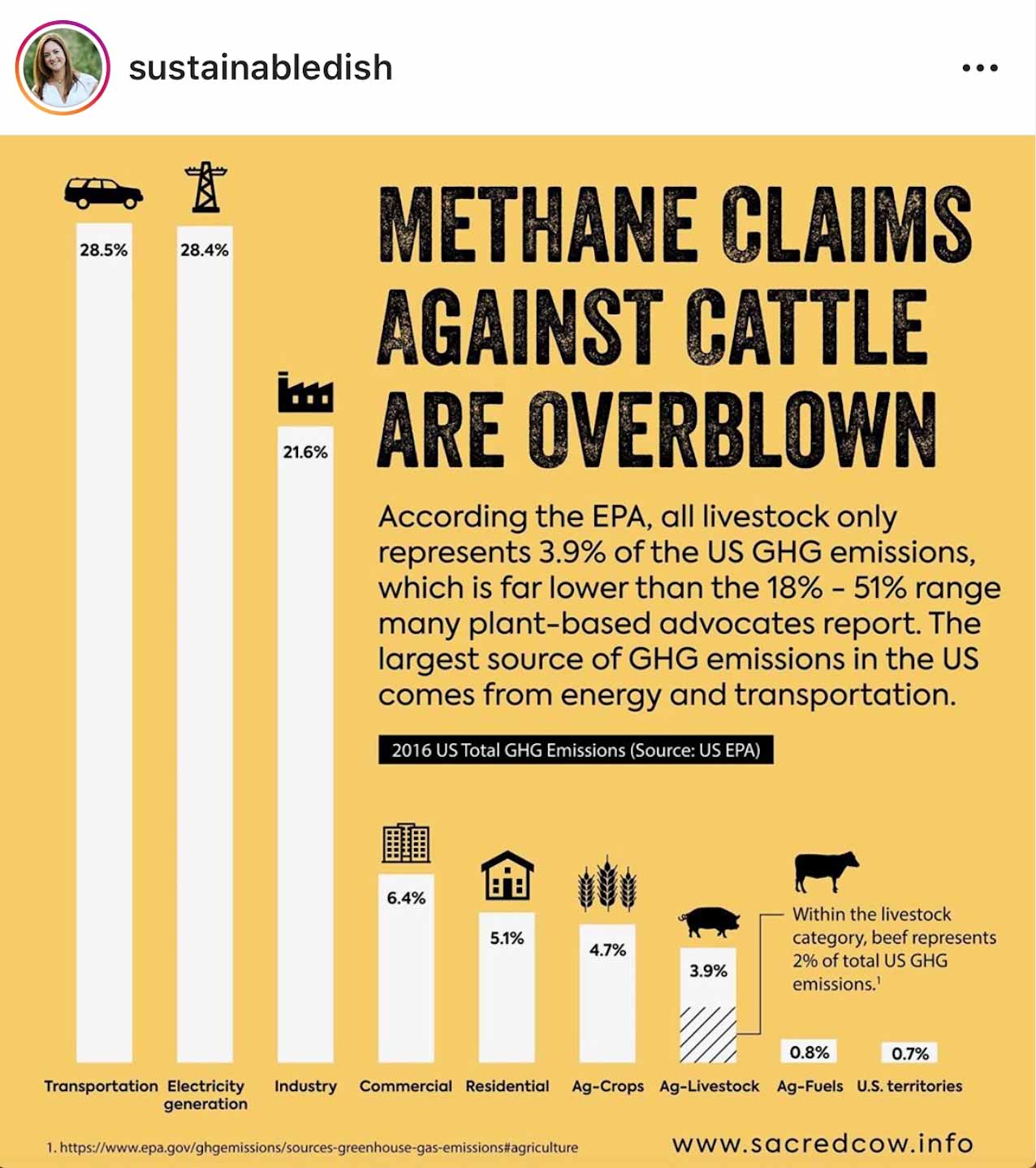 Furthermore, cattle are not the water hog they are portrayed to be in the documentary. Check out these infographics from SacredCow that explain the real statistics behind the environmental impact of meat consumption.
Furthermore, cattle are not the water hog they are portrayed to be in the documentary. Check out these infographics from SacredCow that explain the real statistics behind the environmental impact of meat consumption.
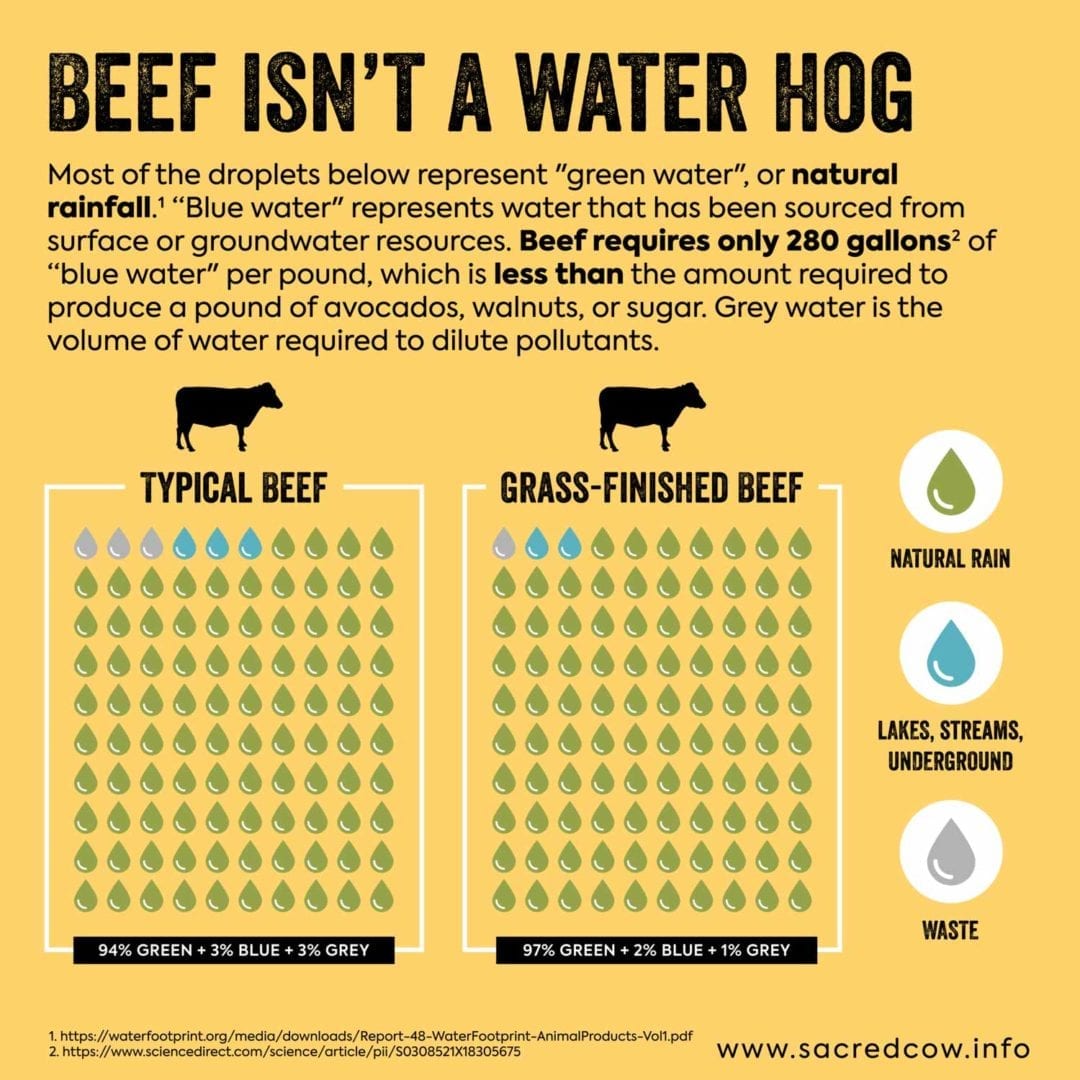 The documentary also misconstrues the impact of feed for livestock: [68] [69] [70]
The documentary also misconstrues the impact of feed for livestock: [68] [69] [70]
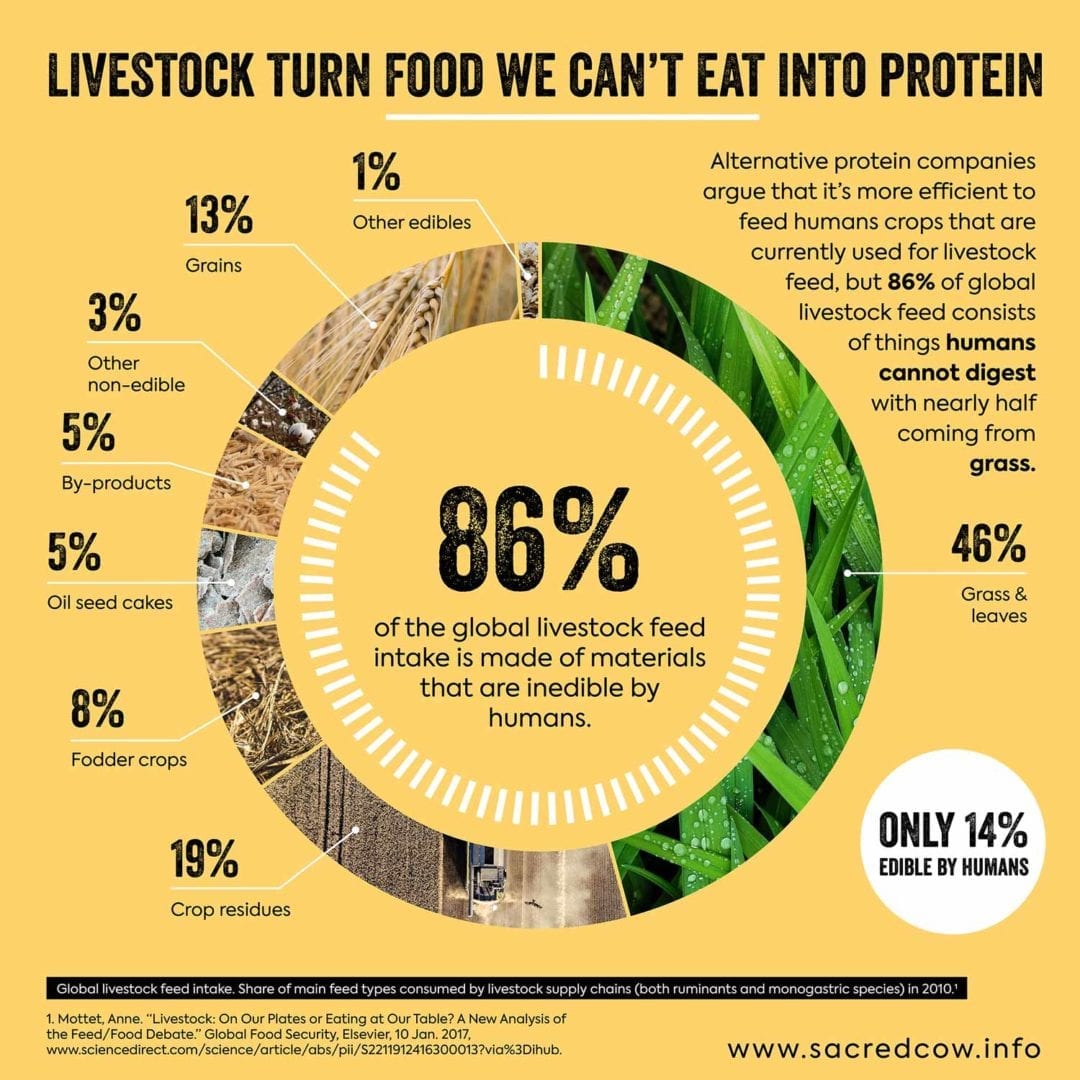 Instead, we should be focusing on limiting unnecessary transportation and electricity emissions. I 100% agree we need to work on saving our environment, however we should focus on Walk to Work Wednesday’s instead of Meatless Mondays. For more specific information on carbon emissions and the effect of cattle emissions and exact studies, check out our article: Amazon Rainforest Fires and the Environmental Impact of Meat.
Instead, we should be focusing on limiting unnecessary transportation and electricity emissions. I 100% agree we need to work on saving our environment, however we should focus on Walk to Work Wednesday’s instead of Meatless Mondays. For more specific information on carbon emissions and the effect of cattle emissions and exact studies, check out our article: Amazon Rainforest Fires and the Environmental Impact of Meat.
Additional Considerations
Dean Ornish controversy
Everything that this man says in the documentary is extreme. At one point in the documentary he claims “People who eat a diet that’s high in animal protein have a 75% increased risk of premature death from all causes and a 400 -500% increased risk for death from most forms of cancer, prostate, breast, colon cancer, as well as type 2 diabetes “. [71] The problem with this study like many longitudinal studies like it, is that it relies on someone surveying what they ate over the course of 18 years. These researchers looked at a database of what an individuals said they ate on average (and let’s be honest, most people don’t know exactly how many calories and the macronutrients they eat each day) and compared it to all causes of death. That literally includes lung cancer from smoking and trauma from a car accident. Not to mention, prostate, colon, and breast cancer are all highly heritable meaning that genetics plays a large role and was not taken into consideration. Furthermore, in the acknowledgments you can see this study was conducted and funded by a company with equity invested in a company that sell plant-based “scientifically-backed” meal plans/programs and foods.
Dean Ornish himself has been highly criticized for inflating and misconstruing data from other researchers to try and fit his agenda to help sell his products (there is even a whole section just dedicated to his controversy on his wikipedia page https://en.wikipedia.org/wiki/Dean_Ornish).
Melinda Wenner Moyer, a scientific writer for Scientific American, wrote a length rebuttal about all of these ill-practices. Rather than re-has what she has to say, I highly recommend you take a look at her article breaking down all of his scientific blunders. https://www.scientificamerican.com/article/why-almost-everything-dean-ornish-says-about-nutrition-is-wrong/
At the very beginning of this article, I highlighted the effects of documentary bias and how many individuals highlighted in this video had a monetary stake in the plant-based agenda. Here are some examples:
- It was already mentioned that Dr. Dean Ornish is a highly controversial figure who sells plant-based books and programs.
- The documentary was directed by James Cameron, who also happens to own a pea protein company.
- Jame Cameron’s wife appeared on Oprah encouraging fans to be completely plant-based at least one day.
- Robert Vogel is another individual who sells a book called The Pritikin Edge that focuses on the benefits of a plant based diet.
- It was mentioned that Dr. Aaron Spitz was the author of The Penis Book, but it should be known that this book heavily focuses on a plant-based diet for male reproductive health.
- Rip Esselstyn is the son of Dr. Caldwell Esselstyn, a man who sells programs and other various forms of media promoting a plant-based diet.
Firefighters
The histological images shown in this portion of the documentary were extremely misleading. Rather than explaining the differences in the arteries, Rip Esselstyn says one artery is a clean artery and the other is from “decades eating meat and dairy diet”. This is a ridiculous statement. The first artery is a healthy artery and the second is of an atherosclerotic artery. This damage to this artery was not directly caused by meat and dairy consumption. Not to mention, these arteries look like they are from entirely different locations on the body. Look at the images below. They probably look like really unhealthy arteries too, in comparison to the first image Rip showed. No– they are perfectly healthy arteries taken from the spermatic cord and an arcuate artery respectively. Different areas of the body have wildly different histological looks. [72]
As for the biomarkers that were significantly changed in the firefighters, this was a poorly controlled study. On top of changing their diet, they subsequently reduced total caloric intake and began exercising more. This is what caused the weight loss, which subsequently caused reductions in cholesterol biomarkers. Any individual who is overweight or obese will see similar reductions in mass and cholesterol is they drop their caloric intake and increase energy expenditure. For example, these studies below detail how a diet that is almost the exact opposite of plant based (ketogenic diet– high fat, typically high meat intake) can reduce body fat mass and cholesterol and improve cardiovascular biomarkers. [73] [74] [75] [76] [77]
Conclusion
Let me make one thing very clear. I am not anti-vegan. I’m anti-propaganda and pro-context because without it, people can misconstrue what is actually being stated. The goal of this article is to show the evidence that this documentary omitted or failed to provide context for. I would hate for people to see The Game Changers and then switch to a plant-based diet without being informed on actual effects, proper dietary supplementation needs, etc.
Our goal is to help you be the healthiest version of yourself, and not suffering from sarcopenia and frail bones at an early age because of low-quality amino acid intake, and limited vitamin and mineral supplementation.
It is actually possible to do a plant based ketogenic approach and I sat down and discussed this with my friend Dr. Will Cole on my podcast (https://www.youtube.com/watch?v=lxZAfyOuTsk)
If you’d like to learn more about the environmental impact of meat consumption, check out my What The Fat podcast episode where I speak with Amanda Radke here: https://www.youtube.com/watch?v=ef08JGkKubQ
I must say, I did laugh hysterically at this little clip our videographer put together from a recent interview Arnold did talking about the documentary… (https://www.instagram.com/p/B37968_gkIW/)
At the end of the day, I think both vegans and omnivores can agree on one thing – more whole goods and less processed junk. Let’s work towards a healthier world by starting there.
References
Lösch, S., Moghaddam, N., Grossschmidt, K., Risser, D. U., & Kanz, F. (2014). Stable isotope and trace element studies on gladiators and contemporary Romans from Ephesus (Turkey, 2nd and 3rd Ct. AD)–implications for differences in diet. PloS one, 9(10), e110489.
Nucilli, R. (2018). Gladiators Diets Were Carb-Heavy, Fattening, and Mostly Vegetarian. Atlas Obscura.
Mastro, D. (2009). “Fat” Gladiators: Modern Misconceptions Regarding the Dietary Practices of Swordsmen of the Ancient Roman Arena.
Reid, H. (2006). Was the Roman Gladiator an Athlete? Journal of the Philosophy of Sport.
Harrison, A., & Bartels, E. (2016). A Comparison of Ancient Greek and Roman Sports Diets with Modern Day Practices. Journal of Nutritional Science Research.
(2014.) What Olympians Ate in Ancient Games. Seeker.com.
Taylor, C. (2016). Chael Sonnen: Nate Diaz was 14-15 pounds heavier than Conor McGregor at UFC 196. MMA News.
Outside Adventure. (2019). How Joe McConaughy Set an AT Speed Record.
Ruggiero, A. (2018). Karel Sabbe Smashed Appalachian Trail Record by 4 Days. GearJunkie.
Miles, K. (2018). Karel Sabbe Is About to Make FKT History on the AT. Outside Adventure.
Bitter, Z. (2013). Evolving Diet and Sample Day.
Millward, D., Layman, D., Tome, D., & Schaafsma, G. (2008). Protein quality assessment: impact of expanding understanding of protein and amino acid needs for optimal health. The American Journal of Clinical Nutrition.
Norton, L. E., Wilson, G. J., Layman, D. K., Moulton, C. J., & Garlick, P. J. (2012). Leucine content of dietary proteins is a determinant of postprandial skeletal muscle protein synthesis in adult rats. Nutrition & metabolism, 9(1), 67.
Wilson, Jacob M., et al. Effects of amino acids and their metabolites on aerobic and anaerobic sports. Strength & Conditioning Journal 34.4(2012): 33-48.
Wilson, Gabriel. Protein quality and distribution determines anabolic signaling, cellular energetics, and body composition. Diss. University of Illinois at Urabana-Champaign, 2012.
Campell WW, Barton ML Jr., Cry-Campbell, D, et al. Effects of an omnivorous diet compared with a lactoovovegetarian diet on resistance-training-induced changes in body composition and skeletal muscle in older men. The American Journal of Clinical Nutrition. 1999: 70(6): 1032-1039.
Baer, et. al (2011). Whey protein but not soy protein supplementation alters body weight and composition in free-living overweight and obese adults. The journal of nutrition.
Tang, et al. (2008) Ingestion of whey hydrolysate, casein, or soy protein isolate: effects on mixed muscle protein synthesis at rest and following resistance training in young men. Journal of applied physiology.
Volek J.S., et al. (2013). Whey protein supplementation during training augments lean body mass. Journal of American College of Nutrition.
Breen, L., & Phillips, S. (2011). Skeletal muscle protein metabolism in the elderly: Interventions to counteract the ‘anabolic resistance’ of ageing. Nutrition & Metabolism.
Wolfe, ROBERT R., and EDWARD J. Peters. “Lipolytic response to glucose infusion in human subjects.” American Journal of Physiology-Endocrinology And Metabolism 252.2 (1987): E218-E223.
Li et al. 2013. Hass avocados modulate postprandial vascular reactivity and postprandial inflammatory responses to a hamburger in health volunteers. Food and Function 4(3):384-91.
Bae, J., et al. (2001). Postprandial hypertriglyceridemia impairs endothelial function by enhanced oxidant stress. Atherosclerosis.
Giannattasio, C. et al. (2004). Acute Effect of High-Fat Meal on Endothelial Function in Moderately Dyslipidemic Subjects. Arteriosclerosis, Thrombosis, and Vascular Biology. 2005; 25:406-410.
Ddos, B., Conte-Junior, C., Paschoalin, V., & Alvares, T. (2016). Beetroot juice increase nitric oxide metabolites in both men and women regardless of body mass. International Journal of Food Scient Nutrition. 67(1):40-6.
Takeda, K., Machida, M., Kohara, A., Omi, N., & Takemasa, T. (2001). Journal of Nutritional Science and vitaminology. 57(3):246-50.
Allerton, T., et al. (2018). L-Citrulline Supplementation: Impact on Cardiometabolic Health. Nutrients. 10(7):921.
Lomonosova, T., Shenkman, B., Kalamkarov, G., Kostrominova, T., & Nemirovskaya, T. (2014). L-arginine supplementation protects exercise performance and structural integrity of muscle fibers after a single bout of eccentric exercise in rats. PloS one.
Khalaf, D. et al. (2019). The Effects of Oral L-Arginine and L-Citrulline Supplementation on Blood Pressure. Nutrients. 11(7):1679.
Rogerson, D., Maçãs, D., Milner, M., Liu, Y., & Klonizakis, M. (2018). Contrasting Effects of Short-Term Mediterranean and Vegan Diets on Microvascular Function and Cholesterol in Younger Adults: A Comparative Pilot Study. Nutrients, 10(12), 1897.
Rhee S. H. (2014). Lipopolysaccharide: basic biochemistry, intracellular signaling, and physiological impacts in the gut. Intestinal research, 12(2), 90–95.
Wallace, R. J., Gropp, J., Dierick, N., Costa, L. G., Martelli, G., Brantom, P. G., … Leng, L. (2016). Risks associated with endotoxins in feed additives produced by fermentation. Environmental health : a global access science source, 15, 5. doi:10.1186/s12940-016-0087-2
Jay, J. M., Margitic, S., Shereda, A. L., & Covington, H. V. (1979). Determining endotoxin content of ground beef by the Limulus amoebocyte lysate test as a rapid indicator of microbial quality. Applied and environmental microbiology, 38(5), 885–890.
Ornish, D. et al. Can lifestyle changes reverse coronary heart disease? The Lifestyle Heart Trial. The Lancet. 1990. 336(8708): 129-33.
Pubmed Central. (2000). Atherosclerosis. Molecular cell, 2:275-281.
Agric. Food Chem.2011593777-784
Yang, W. et al. Is heme iron intake associated with risk of coronary heart disease? A meta-analysis of prospective studies. European Journal of Nutrition. 2014 53(2):395-400.
McLean, E., et al. Worldwide prevalence of anaemia, WHO vitamin and mineral information system,. 1993-2005. Public Health Nutrition/ 2009. 12(4):444-54.
Zacharski, LR., et al. Decreased cancer risk after iron reduction in patients with peripheral arterial disease: results from a randomized trial. Journal of the National Cancer Institute. 2008. 100(14):996-1002.
Bradley, J., et al. 2019. Unprocessed red meat and processed meat consumption: dietary guideline recommendations from the NutriRECS Consortium. Annals of Internal Medicine.
Owen, OE., Morgan, AP., Kemp., HG., Sullivan., JM., Herrera., G., & Cahill, GF. Brain Metabolism during Fasting. The Journal of Clinical Investigation. 1967. 46(10).
Holland, M. (2016). Ketones: Your Brain’s Preferred Keto Fuel Source. ketogenic.com.
Institute of Medicine (US) Committee on Nutrition, Trauma, and the Brain; Erdman J, Oria M, Pillsbury L, editors. Nutrition and Traumatic Brain Injury: Improving Acute and Subacute Health Outcomes in Military Personnel. Washington (DC): National Academies Press (US); 2011. 11, Ketogenic Diet.
Prins, M. L., & Matsumoto, J. H. (2014). The collective therapeutic potential of cerebral ketone metabolism in traumatic brain injury. Journal of lipid research, 55(12), 2450–2457.
McDonald, T., & Cervenka, M. C. (2018). The Expanding Role of Ketogenic Diets in Adult Neurological Disorders. Brain sciences, 8(8), 148. doi:10.3390/brainsci8080148
Stafstrom, C. E., & Rho, J. M. (2012). The ketogenic diet as a treatment paradigm for diverse neurological disorders. Frontiers in pharmacology, 3, 59. doi:10.3389/fphar.2012.00059
Paoli, A., Bianco, A., Damiani, E., & Bosco, G. (2014). Ketogenic diet in neuromuscular and neurodegenerative diseases. BioMed research international, 2014, 474296. doi:10.1155/2014/474296
White, H., & Venkatesh, B. (2011). Clinical review: ketones and brain injury. Critical care (London, England), 15(2), 219. doi:10.1186/cc10020
Cunnane, SC., et al. Can ketones compensate for deteriorating brain glucose uptake during aging? Implications for the risk and treatment of Alzheimer’s disease. Annals of the New York Academy of Science. 2016. 1367(1): 12-20.
Henderson, T. (2004). High carbohydrate diets and Alzheimer’s disease. Medical Hypotheses.
Seneff, S., Wainwright, G., & Mascitelli, L. (2011). Nutrition and Alzheimer’s disease: the detrimental role of a high carbohydrate diet. European Journal of Internal Medicine.
Kapoor, A., Baig, M., Tunio, S. A., Memon, A. S., & Karmani, H. (2017). Neuropsychiatric and neurological problems among Vitamin B12 deficient young vegetarians. Neurosciences (Riyadh, Saudi Arabia), 22(3), 228–232.
Kuhne, T., Bubl, R., & Baumgartner, R. (1991). Materal vegan diet causing a serious infantile neurological disorder due to vitamin B12 deficiency. Europen Journal of Pediatrics.
Stafstrom, C. E., & Rho, J. M. (2012). The ketogenic diet as a treatment paradigm for diverse neurological disorders. Frontiers in pharmacology, 3, 59.
Maruyama, K., Oshima, T., Ohyama, K. Exposure to exogenous estrogen through intake of commercial milk produced from pregnant cows. Pediatric International. 2010. 52(1): 33-8.
Dilllingham, BL., McVeigh, BL., Lampe., JW., & Duncan, AM. Soy protein isolates of varying isoflavone content exert minor effects on serum reproductive hormones in healthy young men. Journal of Nutrition. 2005. 135(3): 584-91.
Jargin S. V. (2014). Soy and phytoestrogens: possible side effects. German medical science : GMS e-journal, 12, Doc18.
Jargin S. V. (2014). Soy and phytoestrogens: possible side effects.German medical science : GMS e-journal, 12, Doc18.
Vargas S, Romance R, Petro J, et al. Efficacy of ketogenic diet on body composition during resistance training in trained men: a randomized controlled trial. J Int Soc Sports Nutr. 2018;15:31.
Rauch, J. T., Silva, J. E., Lowery, R. P., McCleary, S. A., Shields, K. A., Ormes, J. A., … Wilson, J. M. (2014). The effects of ketogenic dieting on skeletal muscle and fat mass. Journal of the International Society of Sports Nutrition, 11(Suppl 1), P40.
Gregory R.M., Hamdan H., Torisky D.M., Akers J.D. A low-carbohydrate ketogenic diet combined with 6-weeks of crossfit training improves body composition and performance. Int. J. Sports Exer. Med. 2017;3:1–10.
Kephart, W. C., Pledge, C. D., Roberson, P. A., Mumford, P. W., Romero, M. A., Mobley, C. B., … Roberts, M. D. (2018). The Three-Month Effects of a Ketogenic Diet on Body Composition, Blood Parameters, and Performance Metrics in CrossFit Trainees: A Pilot Study. Sports (Basel, Switzerland), 6(1), 1.
Joy, J. Comparative effects of a low-fat diet and a high-fat, ketogenic diet on body composition and athletic performance in recreationally active males and females. DISS. The Graduate School Of The Texas Woman’s University. 2018.
Chatterton, S. The effect of an 8-week low carbohydrate high fat diet on maximal strength performance, body composition and diet acceptability in sub-elite olympic weightlifters and powerlifters. Aukland University of Technology.
Joy JM, Lowery RP, Wilson JM, Purpura M, De Souza EO, Wilson SM, Kalman DS, Dudeck JE, Jäger R.The effects of 8 weeks of whey or rice protein supplementation on body composition and exercise performance. Nutrition Journal. 2013. 20;1.
Environmental Protection Agency. (2019). Inventory of U.S. Greenhouse Gas Emissions and Sinks.
Rosales, M. & Haan, C., Rome, Food and Agriculture Organization of the United Nations, 2006. GHGs across all industries. “World Greenhouse Gas Emissions.”
2019). Amazon Rainforest Fires and the Environmental Impact of Meat Consumption. ketogenic.com.
Stine, L. (2019). Beef if not a water hog- 95% of water allocated to beef production is natural rainfall. Sacred Cow.
Stine, L. (2019). Only a small % of what cattle eat is grain. 86% comes from materials humans don’t eat. Sacred Cow.
Rodgers, D. (2019). Why is it necessary to eat animals? Sacred Cow.
Levine, M., et al. Low protein intake is associated with a major reduction in IGF-1, cancer, and overall mortality in the 65 and younger but not older population. Cell Metabolism. 19(3):407-17.
University of Michigan College of Medicine. https://histology.medicine.umich.edu/
Dashti, H., et al. (2004). Long-term effects of a ketogenic diet in obese patients. Experimental and clinical cardiology.
Paoli A. (2014). Ketogenic diet for obesity: friend or foe?. International journal of environmental research and public health, 11(2), 2092–2107.
Volek, J., Sharman, M., & Forsythe, C. (2005) Modification of lipoproteins by very low-carbohydrate diets. Journal of Nutrition. 135(6):1339-42.
Paoli, A., Rubini, A., Volek, J., & Grimaldi, K. (2013). Beyond weight loss: a review of the therapeutic uses of very-low-carbohydrate (ketogenic) diets. European Journal of Clinical Nutrition.67(8):789-96.
Bueno, N., de Melo, I., de Oliveria, S., & da Rocha Ataide, T. Very-low-carbohydrate ketogenic diet v. low-fat diet for long term weight loss: a meta-anlysis of randomised controlled trials. British Journal of Nutrition. 110(7):1178-87.











What about the compounds like TMAO and Neu5Gc that the documentary mentioned, that only come from animal protein? I looked those up, and the research seems to be clear that they are bad for human health. So obviously there’s SOME difference between getting protein from animal or plant sources?
I would check out both Chris Masterjohn’s and Chris Kresser’s rebuttals of TMAO. The vegan propaganda is very misleading and the research is very weak.
Chris Kresser is the one spreading propaganda. He has made numerous false claims about the evidence presented in the movie. Kresser does not have the background to be reviewing research. His own admission, he took one class on research why attaining his acupuncture degree. He is not verse in research terminology.
Hi, Bob! Could you provide examples of these “numerous false claims” and the research that proves them false? I’m sure most people enjoy learning from both sides, so it would be beneficial for people to gain this insight.
Also, you don’t need a degree to understand research. Yes, it takes time and education, but anyone can learn how to review research from their computer! In fact, most degrees do not have a “research class”. It’s a skill you learn over time by reading hundreds of papers. Understanding terminology and how to break down the literature is a skill that can be learned and just takes practice!
Hi, Dave! Let’s talk about TMAO first. TMAO, or trimethylamine N-oxide is created by the metabolism of choline, carnitine, and betaine in the gut. Red meat has been demonized because of its high levels of high carnitine and choline, but human studies have not shown an increase in TMAO after the direct consumption of meat in healthy individuals. Correlational and animal studies have implicated a connection, but the same could be said for fish and vegetable consumption. In fact, researchers at the Medical University of Warsaw found that the ingestion of a vegetarian diet significantly increased plasma TMAO levels higher than the consumption of red meat or eggs in rats.
All-in-all, the research on TMAO is actually quite weak. Like previously mentioned, if we look at actually published research, we find that the current studies are all correlational or in animal populations, none in humans testing a direct connection. And of these, not all of them have even shown a link between TMAO and cardiovascular disease as well:
“Not all studies have demonstrated an association between TMAO and atherosclerotic vascular disease. Mueller et al. measured plasma concentrations of TMAO, betaine, and choline in a cohort of 339 patients undergoing coronary angiography and noted that plasma concentrations of TMAO were higher in diabetics compared to euglycemic patients [35]. The plasma levels of TMAO or betaine were not found to be associated with a history of myocardial infarction, the angiographically-assessed presence of coronary heart disease, or the incident cardiovascular events during 8 years of follow-up. In a case-control study of patients with large-artery atherosclerotic ischemic stroke and transient ischemic attack, participants with asymptomatic atherosclerosis did not exhibit an obvious change in gut microbiota and blood TMAO levels; however, stroke and transient ischemic attack patients showed significant dysbiosis of the gut microbiota, and their blood TMAO levels were decreased ”
Furthermore, there are other health conditions that can raise TMAO outside of just diet, including kidney disease, and type 2 diabetes.
*An interesting point of research is the fact your gut needs specific TMAO producing bacteria, which have been shown to be significantly reduced in the guts of individuals who follow a low-carbohydrate or ketogenic diet.
Now let’s talk about Neu5Gc. This is a signaling molecule that is found in some mammals, but not in humans. Since this molecule functions to distinguish normal cells from foreign cells, it has been theorized that when consume meat from cows, we are consuming Neu5gc which can then cause an immune reaction to our bodies. This, however, has not actually been actually demonstrated in direct human studies, again only correlational or in animal models. One study did look at Neu5Gc antibodies in 75 healthy individuals and found that “the level did not change with age or diet, and there was some variability associated with (vi) previous vaccination history and (vii) the geographic region in which the individual spent his or her childhood.”
Hope this helps answer your questions!
Point 3 : It was never pointed out that plant-based athletes are superior to meat eating athletes. It was only said that plant based food is enough to stay at the top level of any sport which is completely true as shown in the documentary.
Point 4: Is wheat the only plant-based food that you could include when comparing the leucine content in the amino acids? Haha, what a great comparison there! Completely unbiased.
Hi, Vegan! I would love to help clarify some of these issues you pointed out.
Point 3: The documentary specifically states that Kendrick Farris and Patrik Baboumian became stronger on a plant-based diet as compared to their meat-eating days of the past.
Point 4: If you continue reading you will see that wheat was only one example. In fact, the main emphasis of that section is on comparing soy protein to whey, which is what is compared several times within the documentary.
I hope this clarifies up some confusion and I hope you have a great day!
I would like to support Vegan in saying that your response does not address what he is saying.
Point 3 : saying that somebody became stronger on a plant-based diet as compared to their meat-eating days does NOT mean that plant-based diets are superior. Clearly it means that it is for some individuals, but not that it is the norm. I thought that “The game changers” was extremely biased, but your article is clearly as biased. If you pose yourself as a fact lover who values logic, please do not take an example to be the norm, just like what the documentary is doing. I have multiple examples around me, and myself, who claimed to have seen an improvement when switching to more plants in their diet. Personal experiences are valuable, but they are not research. It’s also a problem to consider all research as neutral, and this is coming from somebody with several publications in scientific journals, but that is another topic.
Point 4 : It is well known among serious vegetarians and vegans that soy is not a good source or protein. Why are beans and others excluded? If you want to be serious, don’t stoop to the level of the documentary you are trying to debunk.
In addition to that:
Point 10: I find what you say to be extremely detrimental to our future. I do agree it is a complex topic but there is a pretty good scientific consensus that meat-consumption IS bad for the environment. If you are trying to blur the line by comparing to transportation only and not looking at the environmental impact, this is extremely disingeneous. I do want people to have healthy diets, but who cares in the environment declines to the point where we cannot afford these diets? Let us get our priorities straight.
Eating less meat in general will be required if we want to sustain our population, there is no way around it.
Edit: you do say some about Walk to work versus Meatless Monday. I agree. A better way to say it is that it should be both, and for many people not driving to work is not an option.
Again, simply trying to debunk for the sake of debunking is NOT a serious analysis.
I find that your claims to be non-biased cannot be taken seriously.
Breaking down what was wrong in the documentary is great. But not taking an equal amount of time to explain what is correct is not being neutral either.
You come accross as strongly anti plant-based, not just anti- bias or lack of context.
I find it alarming that this article is “anti-propaganda” and claim to be non-biased when Keto-Club is on the menu bar for this website. This is promotion of a very specific website. Dr. Ornish does have a program approved by medicare to treat chronic diseases in patients. I guess we need to debunk all the officials in DC who voted to implement this.
Hi, Bob! The point of this article was to go along with Dr. Ryan Lowery’s video breaking down some of the errors in the documentary. Since the documentary was one-sided, this article was meant to give the other side, backed by research. Our goal is just to make sure people are as informed as possible and help breakdown the science in a digestible manner, because a lot of people don’t know/have never learned how to read published research. Keto Club isn’t a program to treat diseases, it an education-based platform that helps deliver science-backed information to people who want to learn more. We help breakdown the research so people can understand nutritional science a little better. I hope this helps clarify any misconceptions you may have! Have a great day!
I agree that films like this have an agenda and are pretty biased, but they exist in both camps. This film was made to show that you can be an athlete and eat all or mostly plants. I wish they had left out the parts where they smeared keto, because its absolutely not necessary to get the message across.
However, having given them both a go, at different points in the last few years, I can say that both diets do exactly what they claim to do, if followed closely. You will lose weight on keto if you get your macros right and are somewhat calorie neutral or deficient. You will lose weight on WFPB if you prioritize nutrient-dense fruits and vegetables and avoid or moderate calorie-dense foods(nuts, seeds, oils, starchy-carbs).
The simplest way to look at this is Follow the Money! Who stands to profit from ketogenic or WFPB(Whole Food Plant Based) diets? Meat and Dairy Lobbies. Keto evangelist and supplement makers. Where is the broccoli and kale lobby? Of course there are tons of plant-based products out there, but most of them are processed and should be used sparingly or avoided anyway(***Talking to you Impossible and Beyond Burgers***).
Look at the number of expensive keto products on the shelves. They are typically are very helpful with the diet., but they are not food. As an athlete having to add extra fat just feel full and get your calories in. I won’t even start on the constipation. TMI. With a keto diet, my wife and I were endlessly supplementing with electrolytes and salt to avoid discomfort, disfunction and dehydration. At one point, she had a near catastrophic electrolyte imbalance and was very sick.
Most responsible and health conscious, plant-based folks typically only need vitamin B-12 regularly, if they are eating a good variety, but not several times a day like we did with electrolytes. If that bothers you, you can get most of your needs met with occasional piece of meat or fish. Your body is incredibly efficient at recycling b-12.
If you haven’t given them both a go, it’s worth a shot. Be a scientist. Personally, I feel better in my body when prioritizing plants. And it feels sustainable. Not so much with keto. But all this is to say, there is no need for all this dogma in food.
❝These ancient Olympians were some of the first athletes to incorporate meat into their diet in order to perform performance.❞ … in order to perform performance???
Thank you for the counterweight that this article represents in this conversation. I was actually relieved to see that someone had responded to the message that this documentary was promulgating with such (IMO) conveniently represented evidence. Well done.